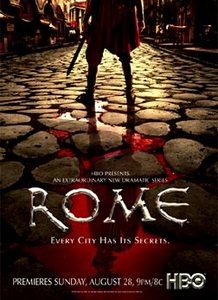 Rome (2005). The first time I caught this HBO/BBC series was in Perth in 2005 and on broadcast television, and back then while I had a rough idea to what the story was about and where it was going – on account that I’d devoured Colleen McCullough’s Masters of Rome historical-fiction novels – lots of the little nuances and subtleties of Rome remained lost on me. A second viewing on DVD rental when I returned to Singapore didn’t improve matters much, and that was from the absence of subtitles. Laugh if you must, but I need subtitles to fully appreciate everything I watch on the screen.
Rome (2005). The first time I caught this HBO/BBC series was in Perth in 2005 and on broadcast television, and back then while I had a rough idea to what the story was about and where it was going – on account that I’d devoured Colleen McCullough’s Masters of Rome historical-fiction novels – lots of the little nuances and subtleties of Rome remained lost on me. A second viewing on DVD rental when I returned to Singapore didn’t improve matters much, and that was from the absence of subtitles. Laugh if you must, but I need subtitles to fully appreciate everything I watch on the screen.
So this is the third time I’ve returned to the series, with subtitling finally, and I can finally see why where the huge budget of the series went to, why it picked up all those awards for directing, acting and story-telling and yet why it was still in some ways flawed. As described in earlier here in our blog, the series centers on two ex-soldiers, Lucius Vorenus (Kevin McKidd) and Titus Pullo (Ray Stevenson), as they find themselves participating in historically significant events that span 18 years from 49 to 31 B.C. Some of these events include the falling out between Pompey Magnus and Julius Caesar, the latter’s ascension to Dictator of Rome, his assassination, the political turmoil and civil war that followed, and finally to his nephew Octavian Caesar becoming the first emperor of Rome in 31 B.C.
At some level, the way the series tries to intertwined our two ordinary ex-military characters into history works like Forrest Gump. The decisions in the historical events they make occasionally look routine or ordinary to themselves, but with our knowledge of history 2000 years after the fact of course, we know that those events are anything but trivial. It’s all fictitious of course. While the two characters of Vorenus and Pullo do exist historically – both are mentioned in Caesar’s memoirs of the Gallic Wars – I’m quite sure their influence on history is anything but rooted in reality.
Still, it makes for an interesting story device once you can get over the extreme coincidences (i.e. person the right spot and at the right time in history) involved. One of the best things in the series are the two lead characters themselves; Vorenus and Pullo. Vorenus, as the story starts, is a junior officer. He’s serious minded, extremely loyal and morally-grounded, but also deeply pessimistic and sardonic. Here’s a man who has loads of moral scruples about all the debauchery and sin that goes on around him, and he isn’t afraid to say so when the occasion calls for it even to Caesar and Mark Anthony. Yet, for all his virtues, he’s awkward around women and finds it difficult to express his real sentiments for his wife, Niobe (Indira Varma). Pullo, on the other hand, is vulgar, bad-tempered, too familiar with women, a bit of a thuggish brute, kills without thought, but yet possessing a tenderness for those he cares for.
The two are supported by a cast of historical characters that include the famous Julius Caesar (Ciarán Hinds), Mark Anthony (James Purefoy), Marcus Junius Brutus (Tobias Menzies), Octavian Caesar (Max Pirkis/Simon Woods), Atia of the Julii (Polly Walker), and many others. It’s a mostly UK cast, with the odd European actor here and there included.
The performances are incredibly consistent and great across the board, and I don’t say that lightly. While most of the actor awards were eventually heaped on Polly Walker for her role as the scheming Atia (mother of Octavian Caesar), there is no ‘weak link’ in the cast. Once you can get past hearing ancient Roman characters speaking with British accents, you’re rewarded with a great sense of world immersion you receive from watching the cast. They look the part already – more on the costumes and sets later – and play their roles with little mannerisms that are consistent with the kind of social and political system of that day. In fact, one of the themes that come across very strongly is the divide that existed between the different social classes of Ancient Rome. You have slaves, the working class, and the nobility, and the stories are tightly woven involving characters from all three.
Continued in the next post.
Recent comments